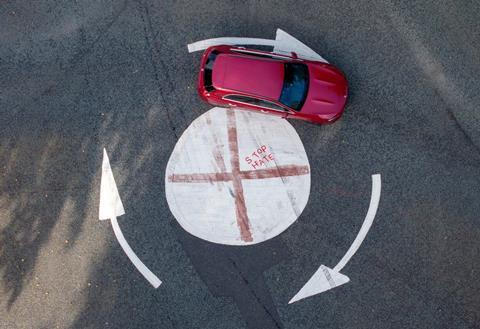Is the sudden hoisting of England flags a positive sign of patriotism, or a dangerous endorsement of hateful views? Danny Webster explores the issues

If I look out my window, and lean out a bit, I can just about see the mini-roundabout at the end of my road that last week was adorned with a red cross over the white circle.
Similarly, as I drove nearly the length of England last week flags, both the St George’s cross and the Union Jack, were draped over many if not most motorway crossings.
High streets around the country are seeing flags hoisted on lamp posts, hung over balconies and painted onto potholes – the latter jokingly noted as being the quickest way to get the council to fill them in.
Is this phenomena something which we should celebrate as an positive celebration of national identity, or counter as the indication of a turn towards extremist politics which seeks to exclude and isolate?
The context is of course important. This is different from the regular requisitioning of white and red regalia when the England football team wins one or two matches in an international championship and cries of “it’s coming home!” start to echo across the nation. This current outpouring of national identification has followed protests over the housing of asylum seekers in hotels, and the continued arrival on small boats crossing the channel of people claiming asylum.
Political pledges to address immigration have also been a constant feature of the summer’s news, coming from the Labour government, the Conservative opposition, as well as from the poll-leading Reform Party. Politicians feel that they need to be seen to be doing something, but many similar pledges have been made over the decades and not kept.
Loyalty to a nation is not an unbiblical idea, but our earthly location is secondary to our kingdom identity
Is the use of the flag, and its current prominence a healthy symbol of national pride or a warning sign of racism and intolerance? And does the presence of the cross of St George make this a more complicated matter for Christians to consider?
On the matter of the Christian cross at the centre of the flag, I think that is largely an irrelevance. For some it may be used as a way of trying to indicate that England or the UK is a Christian country, for some it might even hark back to the Crusades. In these cases it may be viewed positively or negatively but I think the link is tenuous. That said, if we do think of the cross on a flag as a symbol of religious belief it should remind us that our ultimate loyalty lies not to any kingdom of this earth but to God’s kingdom.
Loyalty to a nation is not an unbiblical idea, but our earthly location is secondary to our kingdom identity. Therefore demonstrating an affinity with those you live with is a reasonable thing to do.
But for many, the proliferation of flags is instead viewed as a symbol of exclusion, isolation, and even racism. The flying of a flag, or the painting of a roundabout, is viewed as a proxy for being against immigration – whether legal or illegal. Attitudes to immigration are also tied to views on race and integration, therefore the presence of a flag can be viewed as representing a view that people from other nations, in particular people who are not white, are not welcome here.
This is not to say that everyone hanging a flag, or painting a white and red cross, is advocating for exclusion or holds racist attitudes, or even agrees on how best to manage immigration, but the association is there, and we cannot pretend it is not
One of my concerns is that this further polarises debate around immigration, asylum and community cohesion: that one is either for it without question, or supports some form of ethnic nationalism. In truth there are innumerable positions, on different forms of immigration, on the consequences and costs of different approaches to managing it, to our obligations both legal and moral to those fleeing war and persecution, to the integration and cohesion of communities in our country. These are all issues that deserve consideration and nuance, and remembering that people, whether entering this country or feeling that their home is not as it once was, are at the epicentre of these policy questions.
These are issues that we have to talk about. We have to understand fears and concerns, and respond with wisdom. We must not use fear as a rallying cry. Neither should we appeal simply to compassion as a way of ending a complicated conversation.
My question to those who are painting flags, as well as all of us who are seeing them on our streets, is what does the flag mean? Whether we view it positively or negatively, let’s put fear and fear-mongering to one side and respond with wisdom and compassion. The Kingdom we belong to is not an earthly kingdom, but the one ruled by the King of Kings. It is the Cross of Christ, not the Cross of St George that we should follow.






































2 Readers' comments